 Petzlover
Petzlover Both Devon Rex and Manx are originated from United Kingdom. Both Devon Rex and Manx are having almost same weight. Both Devon Rex and Manx has almost same life span. Both Devon Rex and Manx has same litter size. Both Devon Rex and Manx requires Low Maintenance.
Both Devon Rex and Manx are originated from United Kingdom. Both Devon Rex and Manx are having almost same weight. Both Devon Rex and Manx has almost same life span. Both Devon Rex and Manx has same litter size. Both Devon Rex and Manx requires Low Maintenance.
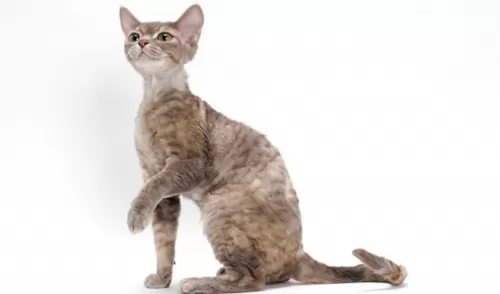 The Devon Rex is a cat known for its large ears and its curly, soft coat. It hails from England, emerging in the 1950s.
The Devon Rex is a cat known for its large ears and its curly, soft coat. It hails from England, emerging in the 1950s.
The cat is recognized by quite a few cat associations. The first of these cats was discovered by Beryl Cox in 1959 in Buckfastleigh, Devon. When the cat started appearing in cat shows in the UK, people starting becoming interested in owning these unusual cats.
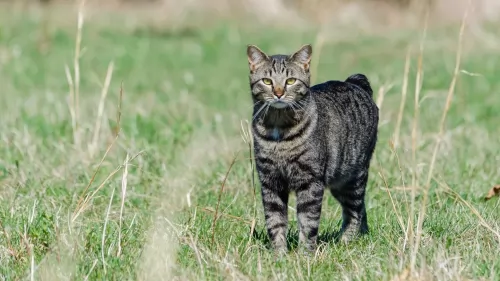 The Manx cat is a domestic cat originating on the Isle of Man, with a short tail. It is one of the oldest cat breeds.
The Manx cat is a domestic cat originating on the Isle of Man, with a short tail. It is one of the oldest cat breeds.
The cat is actually known as being a tailless cat. This is the cat's most distinguishing feature. They've been seen at cat shows since the 1800s.
These cats are descended from mainland stock, whose origins are unknown. It is said these cats are descended from the African wildcat.
The Manx is recognized by the Cat Fanciers Association as well as other cat associations.
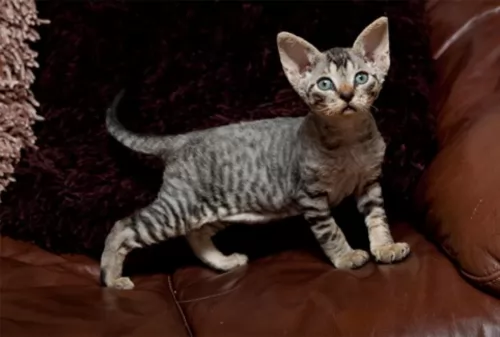 Known for its slender, light build, and weighing roughly between 2 and 4kg, the medium-sized Devon Rex has large, rounded ears. It is the large, rounded ears, set low on the sides of the broad head that make it slightly gremlin-like in appearance.
Known for its slender, light build, and weighing roughly between 2 and 4kg, the medium-sized Devon Rex has large, rounded ears. It is the large, rounded ears, set low on the sides of the broad head that make it slightly gremlin-like in appearance.
Their eyes are also large, and their noses are slightly upturned. It’s short, curly coat is another unusual feature and comes in many colors and patterns. The eyes can be blue, yellow, copper or he can be odd-eyed.
Your Devon Rex is quite a naughty cat, enjoying getting up to all kinds of mischief. Energetic, they love leaping up high onto perches so you’ll often find your Devon Rex in odd spots, more so if it's a spot in the sun as he loves warmth. It is why it is important to buy a cat tree for this cat.
It’s a loving, loyal cat and it will attach itself to one member of the family and then they are capable of pouring out the love and affection on this particular person. They’re also playful cats, as well as being intelligent.
He can learn a few tricks and can also be trained to walk on a leash. This is an active, energetic breed and will provide his human family with hours of amusing entertainment.
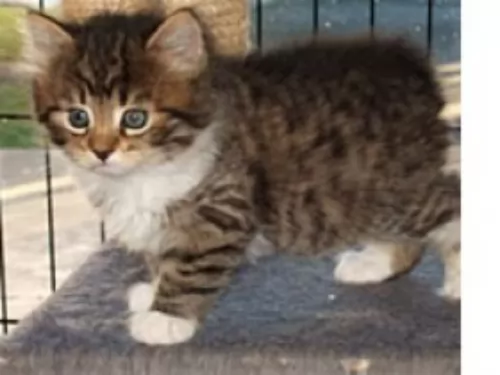 The Manx cat is a medium-sized cat with a stocky, muscular, heavy build. He can weigh between 3 and 6kg. Manx cats come in all coat colors and patterns.
The Manx cat is a medium-sized cat with a stocky, muscular, heavy build. He can weigh between 3 and 6kg. Manx cats come in all coat colors and patterns.
The coat of the cat can be short or long. The long-haired variety is considered its own breed. The cat has always been popular for helping farmers keep rodents under control.
Besides taillessness, the Manx is described as a round cat and its head is round too. The back legs of the cat are much longer than the forelegs.
The eyes of this cat are large and round and can be in different colors such as green, gold, copper, brown, or yellow.
They are very playful and intelligent cats who are devoted to their families. They can easily learn tricks and he can even be taught to walk on a leash.
They’re cats that love to jump and they’re active, playful cats. Don’t be surprised if you see him playing with the water in his water bowl as he is a cat fond of playing in water.
These cats are thought to be dog-like as they’re capable of becoming devoted to their human family. They also have a great sense of humor and they become very entertaining. Children love them as they’re so playful and they in turn get on well with children. When you have a Manx cat in your house, there is never a dull moment.
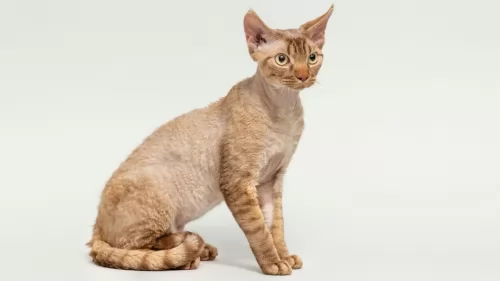 Your Devon Rex is a social cat and is happy to be found on your lap. He doesn’t take kindly to being left on his own though. He isn’t a suitable fit for someone who works all day.
Your Devon Rex is a social cat and is happy to be found on your lap. He doesn’t take kindly to being left on his own though. He isn’t a suitable fit for someone who works all day.
If you love animals, then maybe another companion animal would be a good idea as he is an amicable cat and gets on well with other animals.
When you spend time with your cat, make sure it is a special time, full of treats and stimulating play as he will learn to even fetch a small ball.
Just give him lots of attention and he’ll be your provider of companionship and entertainment.
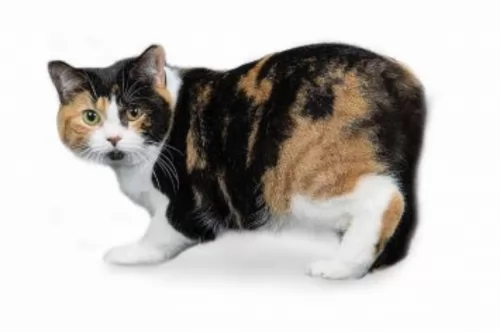 The loving Manx cat is such an even-tempered cat as well and wants to get along well with its entire human family. You can be sure of many years of affection and companionship from this cat.
The loving Manx cat is such an even-tempered cat as well and wants to get along well with its entire human family. You can be sure of many years of affection and companionship from this cat.
It’s a cat that is fairly placid but it still loves to run and play, It’s an amusing cat too and to round everything off it also has a strange way of walking and running.
Give the Manx cat a warm. Loving home and you’ll quickly discover why the Manx cat is such a popular companion cat for so many people. The Manx is such a social, family orientated cat and you shouldn't bring him into your home if you don't have plenty of time for him.
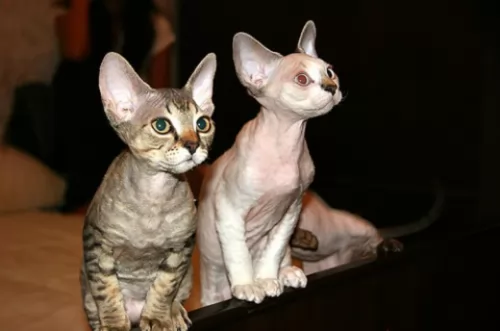 This particular cat isn’t known for any extreme health issues but even so, there are some health problems that are important to know about -
This particular cat isn’t known for any extreme health issues but even so, there are some health problems that are important to know about -
This is where the patella or knee cap moves out of its usual spot. It can occur because of a number of reasons such as an injury or congenital malformation. The vet will want x-rays because sometimes hip dysplasia is also present.
This is an inherited condition seen in both male and female cats and usually in young kittens. The cat has an odd gait with a head that bobs along as is tries to walk. The cat has tremors and also has difficulty with swallowing. With a visit to the vet and special care, your cat can do well.
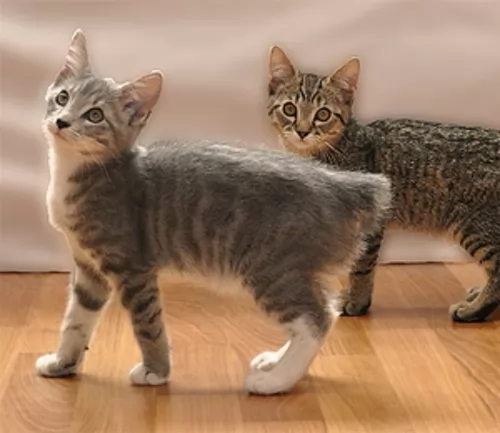 The absence of a tail with the Manx cat is believed to be a genetic defect and because of the spine that looks deformed, it is thought that this would cause the cat problems.
The absence of a tail with the Manx cat is believed to be a genetic defect and because of the spine that looks deformed, it is thought that this would cause the cat problems.
Arthritis can set in early with the Manx cat. Arthritis or osteoarthritis affects many cats and the signs of arthritis in a cat can actually be subtle. The disease can go undetected. Arthritis is about wear and tear in the joints, although other factors such as injury, infection and genetic makeup come into play as well. Arthritis can affect one or more joints in the body such as the hips, elbows ad spine.
The mutant gene that causes the taillessness in this cat may also be responsible for other skeletal deformities in the Manx cat. As a round-shaped cat, the Manx cat can also battle with bladder control.
These ailments are just possibilities with this cat breed and it is more than likely that your Manx cat will never have any one of these diseases.
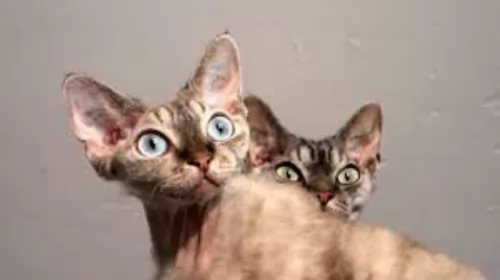 The Devon rex cat breed is known for its unusual looks with its wavy fur, large ears and large eyes. It is considered a rare breed and you want to make sure that you take proper care of him.
The Devon rex cat breed is known for its unusual looks with its wavy fur, large ears and large eyes. It is considered a rare breed and you want to make sure that you take proper care of him.
Owners of the Devon Rex know that these cats love their food and it has to be top quality food to enhance good feline health.
Cats are carnivores, ad this actually means that they should stick to a meat diet. Any food you buy your cat should be mainly meat. Look at the packaging of the commercially manufactured cat foods you want to buy, and make sure that the first few ingredients are some sort of meat.
Remember that any uncertainty with feeding your cat, you can chat with your vet.
Keep the inside of your cat’s ear free of an accumulation of wax and dirt as well as infection. If you don’t like the idea of probing in your cat’s ears, be in contact with your vet or a reputable, professional cat groomer.
Trim the cat’s nails.
Check inside his mouth for bad teeth as this could be causing him pain.
Clean your cat’s litter box every single day and also replace the grit regularly.
Get your cat veterinary care as soon as he shows signs of illness. Certainly, make sure all his vaccines and deworming are up to date.
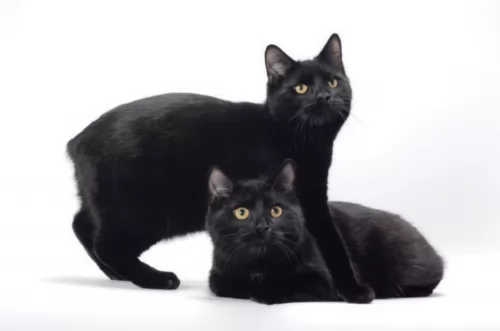 One of the most important caring things that you can do for your cat is to provide him with the best diet there is. The Manx cat requires a balanced diet of protein, vitamins and minerals.
One of the most important caring things that you can do for your cat is to provide him with the best diet there is. The Manx cat requires a balanced diet of protein, vitamins and minerals.
The Manx cat is a carnivore and will need a diet high in protein. Learn to read the labels on the packaging of the commercial cat food, whether wet or dry, and ensure that ingredients such as omega 3 fatty acids and taurine are in the ingredients list.
If you are in any doubt as to what to feed your Manx cat, speak to your vet.
The short coat of the Manx is easily cared for by a brush each week to remove dead, loose hair.
With this tailless cat, you need to check the rear end and perhaps clip the hair short in this area to ensure no feces clinging to the fur surrounding the anus.